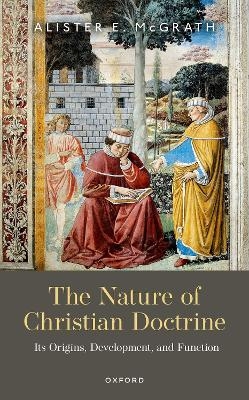
The Nature of Christian Doctrine
Oxford University Press (Verlag)
978-0-19-890144-0 (ISBN)
A groundbreaking account of the origins, development, and enduring significance of Christian doctrine, explaining why it remains essential to the life of Christian communities.
Noting important parallels between the development of scientific theories and Christian doctrine, Alister E. McGrath examines the growing view of early Christianity as a 'theological laboratory'. We can think of doctrinal formulations as proposals submitted for testing across the Christian world, rather than as static accounts of orthodoxy. This approach fits the available evidence much better than theories of suppressed early orthodoxies and reinforces the importance of debate within the churches as a vital means of testing doctrinal formulations.
McGrath offers a robust critique of George Lindbeck's still-influential Nature of Doctrine (1984), raising significant concerns about its reductionist approach. He instead provides a more reliable account of the myriad functions of doctrine, utilising Mary Midgley's concept of 'mapping' as a means of coordinating the multiple aspects of complex phenomena. McGrath's approach also employs Karl Popper's 'Three Worlds', allowing the theoretical, objective, and subjective aspects of doctrine to be seen as essential and interconnected.
We see how Christian doctrine offers ontological disclosure about the nature of reality, while at the same time providing a coordinating framework which ensures that its various aspects are seen as parts of a greater whole. Doctrine provides a framework, or standpoint, that allows theological reality to be seen and experienced in a new manner; it safeguards and articulates the core vision of reality that is essential for the proper functioning and future flourishing of Christian communities.
Alister E. McGrath served as Professor of Historical Theology at the University of Oxford, and subsequently as Andreas Idreos Professor of Science and Religion. He initially studied natural sciences at Oxford and holds a special interest in how scientific method can illuminate aspects of Christian theology. He also served as Professor of Divinity at Gresham College, London, a position established in 1597. He has delivered the Bampton Lectures at the University of Oxford, the Hulsean Lectures at the University Cambridge, and the Gifford Lectures at the University Aberdeen.
Preface
1: On the Origins of Christian Doctrine
2: Theorizing the Identity of Christ: On Early Christian Doctrinal Development
3: The Functions of Christian Doctrine
4: The Three Worlds of Christian Doctrine: Theoretical, Objective, and Subjective
5: Seeing the Face of God: On the Doctrine of the Incarnation
6: Doctrine: Ontological Disclosure and Coordinating Framework
7: The Doctrine of Salvation: Coherence, Comprehensiveness, and Theological Mapping
Conclusion
Bibliography
| Erscheinungsdatum | 03.02.2024 |
|---|---|
| Verlagsort | Oxford |
| Sprache | englisch |
| Maße | 142 x 223 mm |
| Gewicht | 384 g |
| Themenwelt | Geschichte ► Teilgebiete der Geschichte ► Religionsgeschichte |
| Religion / Theologie ► Christentum ► Kirchengeschichte | |
| ISBN-10 | 0-19-890144-5 / 0198901445 |
| ISBN-13 | 978-0-19-890144-0 / 9780198901440 |
| Zustand | Neuware |
| Informationen gemäß Produktsicherheitsverordnung (GPSR) | |
| Haben Sie eine Frage zum Produkt? |
aus dem Bereich


